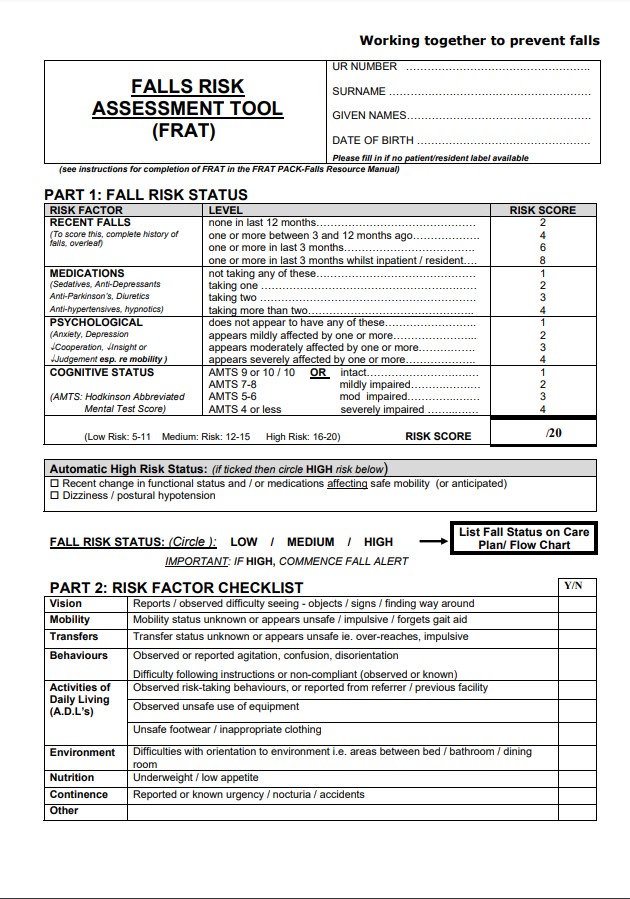9 Easy Facts About Dementia Fall Risk Explained
9 Easy Facts About Dementia Fall Risk Explained
Blog Article
Dementia Fall Risk Can Be Fun For Anyone
Table of ContentsAll About Dementia Fall RiskHow Dementia Fall Risk can Save You Time, Stress, and Money.Top Guidelines Of Dementia Fall RiskHow Dementia Fall Risk can Save You Time, Stress, and Money.Some Known Questions About Dementia Fall Risk.
Make sure that there is a marked location in your medical charting system where team can document/reference ratings and document relevant notes related to drop avoidance. The Johns Hopkins Loss Threat Assessment Device is one of many tools your team can utilize to help stop unfavorable medical events.Client falls in medical facilities are typical and devastating unfavorable events that continue despite years of initiative to lessen them. Improving interaction across the analyzing registered nurse, care group, client, and client's most included loved ones may strengthen autumn avoidance initiatives. A team at Brigham and Women's Medical facility in Boston, Massachusetts, looked for to establish a standard fall prevention program that focused around boosted interaction and person and family involvement.

The innovation group highlighted that successful implementation depends upon client and personnel buy-in, combination of the program right into existing workflows, and integrity to program processes. The group noted that they are facing exactly how to make sure continuity in program implementation during periods of crisis. During the COVID-19 pandemic, as an example, an increase in inpatient drops was connected with restrictions in client engagement together with restrictions on visitation.
3 Simple Techniques For Dementia Fall Risk
These incidents are commonly thought about avoidable. To carry out the intervention, organizations require the following: Access to Autumn TIPS sources Fall ideas training and retraining for nursing and non-nursing personnel, consisting of brand-new nurses Nursing operations that enable for person and household engagement to perform the falls analysis, guarantee usage of the prevention plan, and perform patient-level audits.
The results can be extremely detrimental, typically increasing person decrease and triggering longer hospital keeps. One research study estimated keeps enhanced an extra 12 in-patient days after a person loss. The Fall TIPS Program is based upon appealing individuals and their family/loved ones throughout 3 major processes: assessment, individualized preventative interventions, and bookkeeping to make sure that clients are participated in the three-step fall avoidance procedure.
The client analysis is based upon the Morse Fall Scale, which is a confirmed fall danger evaluation device for in-patient hospital settings. The scale includes the six most typical factors people in medical facilities fall: the individual loss background, risky problems (consisting of polypharmacy), use IVs and various other external devices, mental status, gait, and wheelchair.
Each risk factor links with one or more actionable evidence-based interventions. The nurse creates a strategy that incorporates the interventions and shows up to the treatment team, client, and household on a laminated poster or printed aesthetic aid. Registered nurses develop the plan while meeting the patient and the client's family members.
Dementia Fall Risk Fundamentals Explained
The poster functions as an interaction tool with other participants of the individual's care group. Dementia Fall Risk. The audit element of the program includes assessing the person's understanding of their danger elements and avoidance strategy at the device and healthcare facility levels. Nurse champs perform a minimum of 5 private meetings a month with people and their households to look for understanding of the loss prevention strategy

A projected 30% of these drops result in injuries, which can vary in seriousness. Unlike other damaging events that require a standard scientific response, loss prevention depends very on the demands of the person.
Things about Dementia Fall Risk

Based upon bookkeeping results, one site had 86% conformity and 2 sites had more than 95% conformity. A cost-benefit analysis of the Fall TIPS program in eight hospitals approximated that the program cost $0.88 per patient to apply and led to financial savings of $8,500 per 1000 patient-days in direct costs related to the prevention of 567 drops over 3 years and eight months.
According to the technology group, companies interested in executing the program should perform a readiness analysis and drops avoidance gaps analysis. 8 Furthermore, companies must ensure the essential framework and operations for implementation and establish an execution plan. If one exists, see here now the organization's visit their website Loss Avoidance Task Pressure ought to be involved in planning.
The Ultimate Guide To Dementia Fall Risk
To begin, companies should make certain completion of training modules by nurses and nursing aides - Dementia Fall Risk. Hospital personnel should analyze, based upon the demands of a healthcare facility, whether to utilize an electronic wellness document printout or paper variation of the autumn avoidance strategy. Executing teams must recruit and educate nurse champions and establish procedures for auditing and coverage on autumn data
Team require to be associated with the procedure of upgrading the workflow to engage people and household in the analysis and avoidance strategy procedure. Systems should remain in location to ensure that devices can understand why a fall happened and remediate the cause. Extra specifically, nurses ought to have channels to supply ongoing feedback to both personnel and device leadership so they can change and boost loss avoidance operations and communicate systemic issues.
Report this page